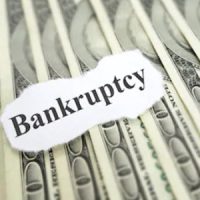Are There Consequences Of Filing For Bankruptcy?

The United States Bankruptcy Code offers people struggling with overwhelming debt an opportunity to start over financially. In the U.S., the two most commonly filed types of bankruptcy are Chapter 7 bankruptcy and Chapter 13 bankruptcy. With Chapter 7 bankruptcy, nonexempt assets are sold, and the proceeds go to paying off debt. On the other hand, with Chapter 13 bankruptcy, you create a plan to pay off some or all the people you owe. However, as much as bankruptcy can be helpful, the truth is that filing for bankruptcy also has some consequences, with Chapter 7 bankruptcy having harsher consequences than Chapter 13 bankruptcy. Before deciding whether filing for bankruptcy is the best way to proceed, you must consider both the pros and cons of bankruptcy and not just the pros. Below, we discuss some of the consequences of filing for bankruptcy.
Loss of Assets
Filing for bankruptcy can offer several benefits, like delaying car repossession and home foreclosure. However, ultimately, losing assets is possible. Bankruptcy can mean losing vehicles, real estate, antique furnishings, jewelry, and other possessions. In Chapter 7 bankruptcy, all nonexempt assets are liquidated, and the proceeds are used to pay off debts. And while you can keep your assets if you file for Chapter 13 bankruptcy, defaulting on payments could result in the loss of those assets.
Most debtors who file for Chapter 7 Bankruptcy strategically plan their exemptions to ensure none of their assets are liquidated or sold by the bankruptcy trustee. To the extent there are non-exempt assets, many debtors choose to elect filing a Chapter 13 repayment plan bankruptcy so that they can keep their non-exempt assets and control the terms of their repayment plan.
Your Bankruptcy Can Impact Other People Negatively
If, for instance, a family member co-signed on a car loan for you, they could still be held responsible for at least part of that debt if you file for bankruptcy. After you file for Chapter 7 bankruptcy, all collection efforts against you must stop. However, collection efforts against co-signers do not stop.
Fortunately, you can take steps to prevent creditors from pursuing your co-signer. For example, you can reaffirm the debt or pay off the debt.
Chapter 13 bankruptcy also provides for a co-debtor stay to stop any collection efforts against a co-debtor during the pendency of you bankruptcy case. It also permits you to specially classify unsecured debts that are co-signed with another person to give the joint debt priority treatment over general unsecured creditors.
Reduced Credit Score
Credit score assesses the ability of a person to pay back debts. Therefore, a bankruptcy filing will most likely hurt your credit score. And for as long as your bankruptcy stays on your credit report, it will keep impacting your score. Depending on which type of bankruptcy a person files, a bankruptcy filing can stay on a credit report for up to ten years.
That said, after filing for bankruptcy, there are several steps you can take toward rebuilding your credit score. For instance, you can get a secured credit card or ask to become an authorized user.
Reduced Access to Credit
A low credit score can make borrowing hard. And if you do qualify for a loan, you will likely have to pay higher interest to make up for your high default risk. It can be especially challenging to get a mortgage after filing for bankruptcy.
Loss of Tax Refund
When you file for bankruptcy, your tax return may be handed over to the bankruptcy trustee to pay off debts. Many debtors can exempt their projected tax refund to avoid this, but this should be part of your exemption planning before you file your bankruptcy case.
Contact a Pennsylvania Bankruptcy Attorney Today
If you are struggling with overwhelming debt, are considering bankruptcy, and need help determining if bankruptcy is the right option for you, contact our skilled and dedicated Lehighton & Carbon County bankruptcy attorney at Adam R. Weaver, Esq.
